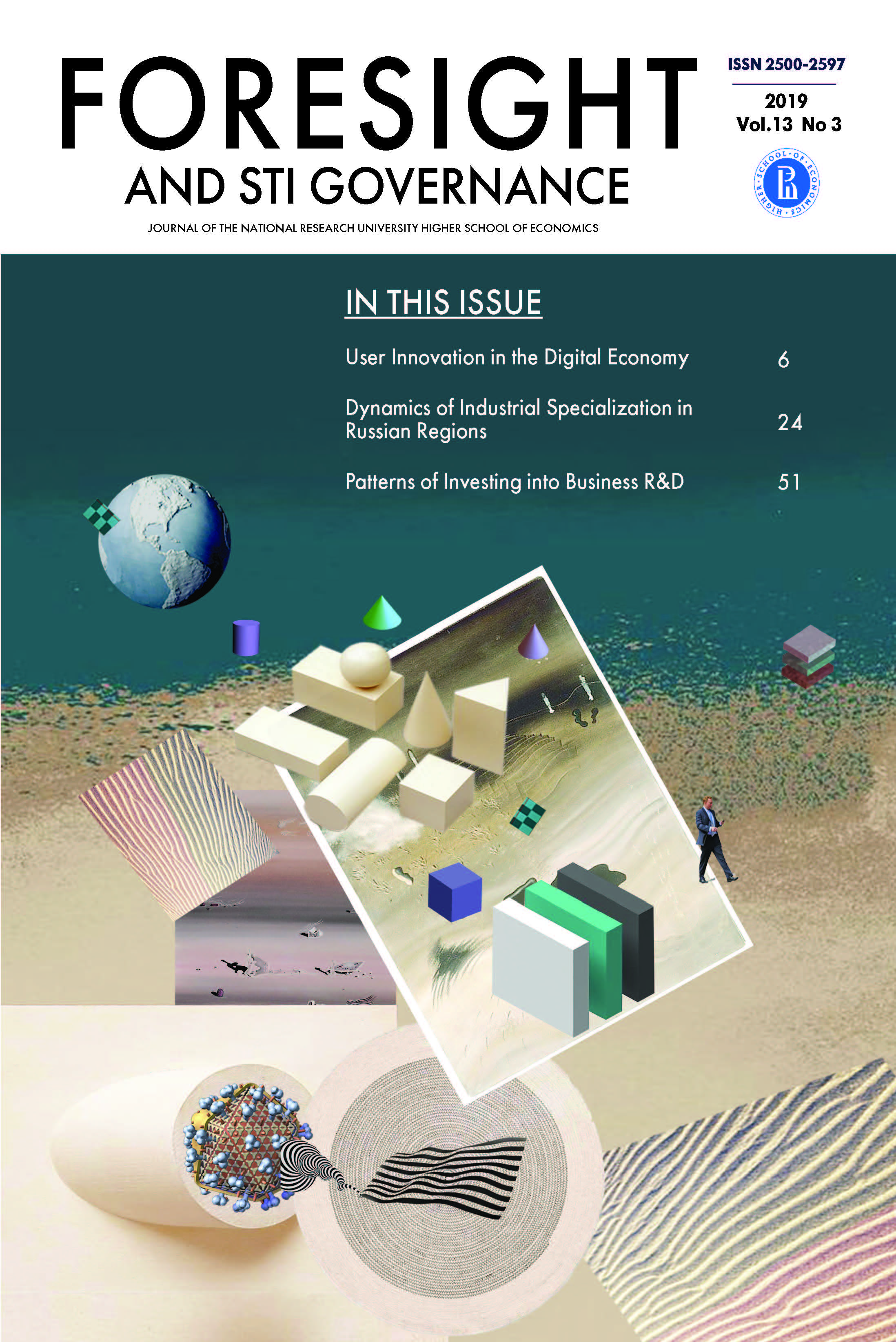Abstract
After several decades of rapid development, South Korea has recently experienced a critical economic downturn. The paper considers the prerequisites for the current state-of-the-art, as well as the new economic policy agenda aimed at fostering innovation in various sectors, thereby suggesting improved policy directions. To implement the innovation-driven policy, the Korean government produced the framework for the Innovative Platform Programme (IPP), which covers a wide range of sectors related to Industry 4.0 like artificial intelligence and blockchain. For the IPP to be successful, the authors believe, it is vital to understand and resolve the trade-offs between contradictory policy priorities — innovation-led growth, income-led growth, and a fair economy.
References
Aghion P., Bolton P. (1997) A Theory of Trickle-Down Growth and Development // The Review of Economic Studies. Vol. 64. № 2. P. 151-172.
Bailey M.N., Zitzewitz E., Bosworth B., Westphal L.E. (1998) Extending the East Asian Miracle: Microeconomic Evidence from Korea // Brookings Papers on Economic Activity. Microeconomics. Vol. 1998. P. 249-321.
Baldwin R., Cave M., Lodge M. (2012) Understanding Regulation: Theory, Strategy, and Practice (2nd ed.). New York: Oxford University Press.
Choi Y.S. (2010) Analysis of the Microsoft, Intel, and Qualcomm Decisions in Korea // European Competition Law Review. Vol. 31. № 11. P. 470-475.
Choi Y.S. (2014) The Rule of Law in a Market Economy: Globalisation of Competition Law in Korea // European Business Organization Law Review. Vol. 15. № 3. P. 419-437.
Decker C. (2015) Modern Economic Regulation: An Introduction to Theory and Practice. Cambridge: Cambridge University Press.
Eichengreen B., Chung D.-K. (2004) Introduction // The Korean Economy Beyond the Crisis / Eds. D.-K. Chung, B. Eichengreen. Cheltenham and Northampton: Edward Elgar. P. 1-24.
Kim G.H. (2017) The Nature and Limits of Income-led Growth Theory // Labour Society. Vol. 197. P. 27-31 (in Korean).
Kim S.S. (2017) A Study on Policy Problem Structuring and Problem Definition: Focusing on the Frame (Discourse) of Economic Democratization // Korean Society and Public Administration. Vol. 28. № 3. P. 53-81 (in Korean).
Kim T.I. (2018) Assessments of the Income-led Growth and Future Policy Direction // Proceedings of the Autumn Conference of 2018 of the Korean Association for Policy Studies. P. 257-286 (in Korean).
Kim W. (2019) A Review on the Fourth Industrial Revolution: Income of the Old Age from Financial Technology // ChosunBiz. 19.05.2019. Режим доступа: http://biz.chosun.com/site/data/html_dir/2019/05/17/2019051701120.html, дата обращения 22.05.2019 (in Korean).
Korean Government (2018) Innovative Platform: The Policy Direction of Strategic Investment for Innovation-Driven Growth (published online 13.08.2018). Режим доступа: http://www.moef.go.kr/nw/nes/detailNesDtaView.do?searchBbsId1=&searchNttId1=MOSF_000000000018581&menuNo=4010100, дата обращения 18.05.2019 (in Korean).
Korean Government (2019) The Governmental Policy on the Eight Leading Industries (published online 20.02.2019). Режим доступа: http://www.moef.go.kr/nw/nes/detailNesDtaView.do?searchBbsId1=&searchNttId1=MOSF_000000000026977&menuNo=4010100, дата обращения 19.05.2019 (in Korean).
Lee J.-H., Chung H.-Y. (2019) Regulatory Sandbox, Korea’s New Regulation Paradigm. Seoul: KISTEP (in Korean).
Lee S.M. (2018) The Effects of Wage-Led Growth Policy on Economic Revival, Price and Employment // Koreanische Zeitschrift fur Wirtschaftswissenschaften. Vol. 36. № 4. P. 87-111 (in Korean).
MSITC (2018) The Innovation Growth Engine. Leading Preparations for the Fourth Industrial Revolution, Seoul: Ministry of Science and ICT. Режим доступа: https://iac.nia.or.kr/board_files/96/download, дата обращения 11.06.2019.
Ministry of Economy & Finance (2018) 5th Ministerial Meeting on ‘Growth through Innovation’ (published online 14.08.2018). Режим доступа: http://english.moef.go.kr/ec/selectTbEconomicDtl.do?boardCd=E0001&seq=4533&boardCdKey=N, дата обращения 31.05.2019.
Ministry of Economy & Finance (2019a) 1st Ministerial Meeting to Promote Innovation in Industries (published online 16.01.2019). Режим доступа: http://english.moef.go.kr/ec/selectTbEconomicDtl.do?boardCd=E0001&seq=4615&boardCdKey=N, дата обращения 31.05.2019.
Ministry of Economy & Finance (2019b) Measures to Boost Ventures (published online 12.03.2019). Режим доступа: http://english.moef.go.kr/ec/selectTbEconomicDtl.do?boardCd=E0001&seq=4640&boardCdKey=N, дата обращения 31.05.2019.
Ministry of Economy & Finance (2019c) 13th Ministerial Meeting on Boosting the Economy (published online 17.04.2019). Режим доступа: http://english.moef.go.kr/ec/selectTbEconomicDtl.do?boardCd=E0001&seq=4662&boardCdKey=N, дата обращения 31.05.2019.
OECD (2017) Economic Outlook No. 101 - June 2017. Paris: OECD.
Park J. (2019) Labor Productivity and Wage in Korean Economy // Korean Economic Forum. Vol. 12. № 1. P. 81-112 (in Korean).
Posner R.A. (2001) Antitrust in the New Economy // Antitrust Law Journal. Vol. 68. № 3. P. 925-943.
Presidential Committee (2019) Income-led Growth (Note by the Presidential Special Committee for Income-led Growth in Korea). Режим доступа: http://ilg.go.kr/html/sub2_1.do, дата обращения 30.05.2019 (in Korean).
Schumpeter J.A. (1942) Capitalism, Socialism, and Democracy. New York: HarperPerennial.
Statistics Korea (2018) Household Income Trends in the Third Quarter of 2018. Режим доступа: http://kostat.go.kr/portal/eng/pressReleases/6/1/index.board, дата обращения 30.05.2019.
Statistics Korea (2019a) Economically Active Population Survey (published online 15.05.2019). Режим доступа: http://kostat.go.kr/portal/eng/pressReleases/5/1/index.board, дата обращения 30.05.2019.
Statistics Korea (2019b) Employment Rate. Режим доступа: http://kosis.kr/common/meta_onedepth.jsp?vwcd=MT_ZTITLE&listid=B1A, дата обращения 21.08.2019 (in Korean).
Statistics Korea (2019c) Economically Active Population Survey. Режим доступа: http://www.index.go.kr/potal/stts/idxMain/selectPoSttsIdxSearch.do?idx_cd=1063, дата обращения 21.08.2019 (in Korean).
Stigler G. (1971) The Economic Theory of Regulation // Bell Journal of Economics. Vol. 11. P. 3-21.
Stiglitz J.E. (2012) The Price of Inequality: How Today’s Divided Society Endangers Our Future. New York: W.W. Norton & Co.
Ungson C.R., Steers R.M., Park S.-H. (1997) Korean Enterprise: The Quest for Globalization. Cambridge, MA: Harvard Business School Press.
Viscusi W.K., Harrington Jr. J.E., Sappington D.E.M. (2018) Economics of Regulation and Antitrust (5th ed.). Cambridge, MA: MIT Press.

This work is licensed under a Creative Commons Attribution 4.0 International License.

